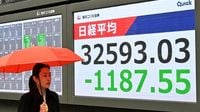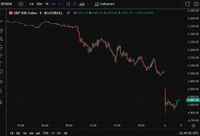On Monday, April 7, 2025, Asian markets plunged dramatically as fears of a global trade war, triggered by U.S. President Donald Trump’s tariffs, swept through the region. The Hang Seng Index in Hong Kong led the decline, plummeting 9.56% in early trade, while mainland China's CSI 300 fell by 4.82%. In Japan, the benchmark Nikkei 225 dropped more than 8%, hitting its lowest level since August 2024, and the broader Topix index sank 8%, exacerbating concerns of an impending recession.
The turmoil follows Trump’s recent imposition of a 24% across-the-board tariff on Japan, which is set to take effect soon. Japanese Prime Minister Shigeru Ishiba remarked that the government will continue to press for tariff reductions from Trump, but acknowledged that results “won’t come overnight.” He emphasized the need for the government to explore all possible avenues to cushion the economic impact of U.S. tariffs on Japanese firms.
U.S. stock futures also took a hit, with significant sell-offs in the previous sessions resulting in over $5.4 trillion wiped off global market values. The Dow Jones Industrial Average experienced its largest drop since June 2020, falling by 2,231.07 points, or 5.5%, to close at 38,314.86 on Friday, April 4. The S&P 500 and Nasdaq Composite followed suit, nosediving 5.97% and 5.8%, respectively, confirming a bear market for the tech-heavy index.
In South Korea, the Kospi index tumbled over 4.8% shortly after opening, triggering a five-minute trading halt due to a circuit breaker meant to prevent panic selling. Taiwan's Taiex saw a staggering drop of 9.7%, with shares in major companies like TSMC and Foxconn falling nearly 10%, activating similar circuit breakers.
Australia's S&P/ASX 200 index fell 6.3% in morning trade, while New Zealand’s NZX 50 lost over 3.5%. The widespread declines across Asia reflect a broader apprehension regarding the economic repercussions of the escalating trade tensions.
On the energy front, U.S. oil prices dropped below $60 a barrel, with West Texas Intermediate crude futures falling to $59.74, their lowest since April 2021. This drop in oil prices is linked to fears that a global trade war could dampen demand and slow economic growth.
Market analysts are expressing concerns that these developments could lead to a significant recession in the U.S. and globally. JPMorgan has increased its forecast for a U.S. recession to 60%, a stark warning as tariffs threaten to undermine business confidence.
“What’s going to happen with the market? I can’t tell you,” Trump commented during a flight on Air Force One, adding, “But I can tell you, our country has gotten a lot stronger, and eventually it’ll be a country like no other.”
The situation is evolving rapidly, with investors and governments alike bracing for further market volatility. Ishiba's comments reflect a growing recognition among leaders in the region that immediate solutions may be elusive. The Japanese government plans to implement support measures for domestic firms affected by the tariffs, aiming to protect jobs and stabilize the economy.
As the global markets navigate this tumultuous period, the ripple effects of Trump’s tariff policies are being felt far and wide. The situation remains fluid, with analysts and investors closely monitoring developments and preparing for potential further declines.
In summary, the fallout from Trump's tariff announcements has led to unprecedented sell-offs in Asian markets, with significant declines across major indices. The fear of a full-blown trade war is prompting global investors to reassess their positions, as the implications for economic growth become increasingly concerning.






